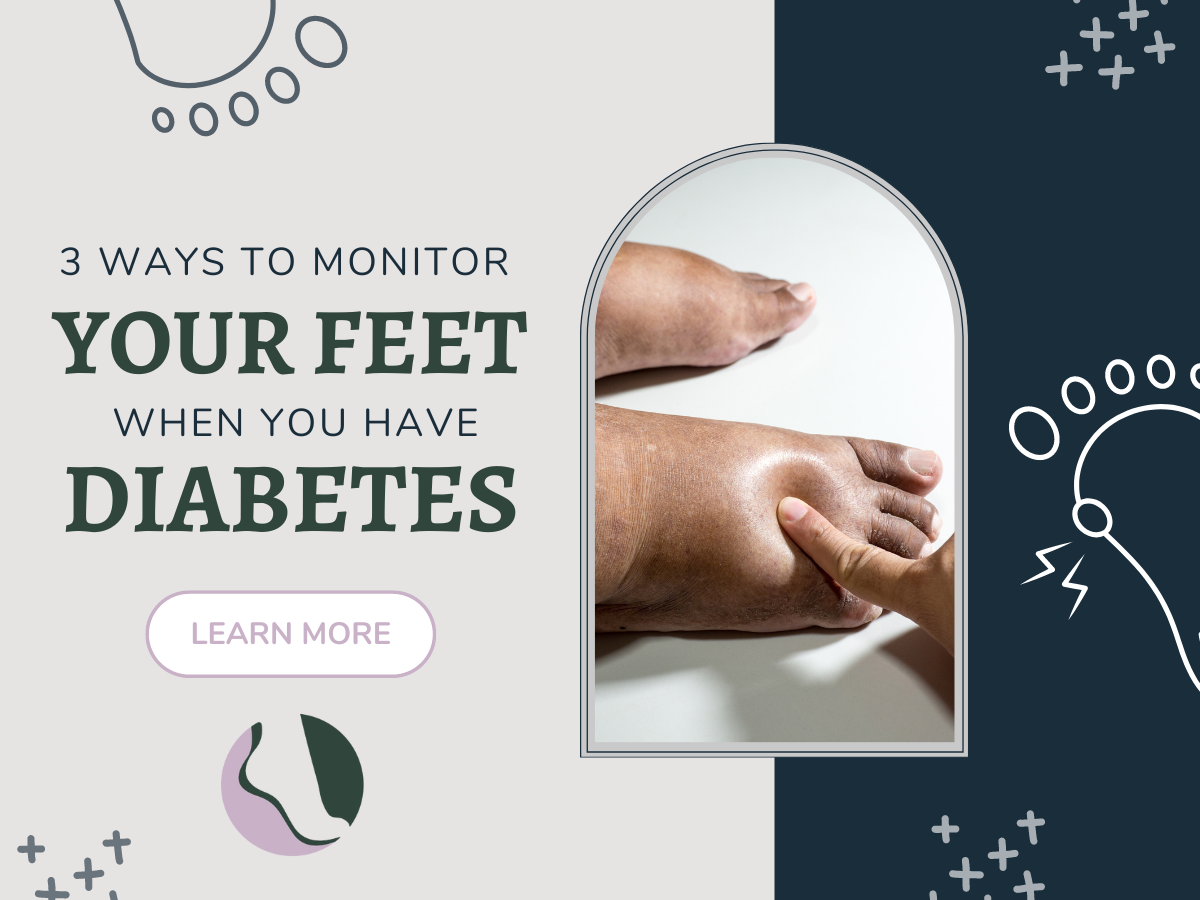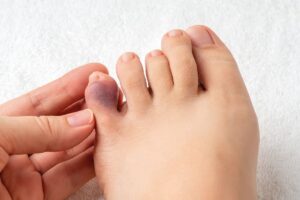If you are a patient with an established history of neuropathy, diabetes, or vascular issues, you should be seeing a Podiatrist every 3 months for routine care. If you have any open wounds, you should be seen every 2 weeks. During the time between visits, here are three ways to monitor your care at home!
ONE- Check your feet every day! Let’s go through it together (use a mirror or a partner can help if you are lacking flexibility). Look at your feet at every angle. Do you have white or purple areas on your skin? Are your nails misshapen, thickening, yellowing or is the skin around them becoming itchy or sore? Have you seen any sores, ulcers, wounds, or cuts that are not healing? Is there an area or bone protruding that looks abnormal? Now check between your toes. Do you notice any dark spots, moles or freckles? If you see any new dark spots on your feet, contact your dermatologist or call our office. Next, feel your feet. Do you notice any signs of swelling? Pay close attention to each area you touch, is anything numb? Is there an area that’s sore? ALL of these things are warning signs. Not only can each of these issues be a problem for your foot, they can also be telling you something about your overall health. You may have an undiagnosed medical condition that needs attention.
TWO- Avoid being barefoot. Neuropathy is common and you could easily damage your foot and be unaware. What is neuropathy? Neuropathy is nerve damage that often occurs in patients with diabetes. When you have high blood sugar, your nerves can be injured anywhere in the body, but with diabetes it’s most commonly found in the feet and legs. Most people with diabetic neuropathy have mild symptoms but for others it can be very painful and lead to other problems with many other functioning systems of the body. Due to the numbness in the feet, if you were to step on a nail, get a splinter, a blister, or even a random bug bite, you may not realize it’s happened. This is why it is so important to (1) not go barefoot and (2) check your feet daily. Be aware of any changes you notice and bring them up to your podiatrist at your regular visits.
Keep an eye out for infections. With neuropathy common in diabetics, infections can occur without your immediate attention. Pay attention to any signs of abnormal redness, swelling, skin temperature changes, smells, drainage/pus, tissue growth, change in the color of your skin or toes, and look for black/blue/purple/green bruising in the skin. These are all warning signs that there may be an underlying infection present. Infections can occur from simple foot injuries. Plantar warts, athlete’s foot, and fungal toenail infections are also common reasons that people develop an infection in their foot. Infections can even be found under calluses!
Check your feet DAILY! If you notice something that is changing, keep an eye on it. If it is prolonged or worsening, call us to schedule an evaluation. We are happy to help! Infections can quickly turn into more serious problems. Seek help early!
THREE- Wear custom orthotics. They can help prevent nerve damage and can allow for proper circulation to occur. Everyone can benefit from custom orthotics, especially patients with diabetes. Those who are on their feet for a large portion of the day, find a lot of relief from custom orthotics. If you have foot pain, pressure points, sore spots, joint pain, an uncomfortable heel, arch pain, even leg or knee pain when wearing shoes and on your feet, you can benefit from custom orthotics. These amazing inserts help support the bones, joints, muscles, and ligaments in your feet. Specifically for diabetic patients, custom orthotics help ensure different parts of your feet aren’t rubbing the wrong way when you are walking which prevents a number of problems down the road.
Do you have any areas that you feel concerned about with your feet or ankles? What other questions do you have about maintaining proper foot care with diabetes? Give our office a call today! We are happy to help.
At Howard County Foot and Ankle, we treat everything from warts and ingrown toenails to flatfeet and heel pain. Many people come to us for diabetic foot care or simply because they have foot pain or ankle pain and don’t know the cause of it. We handle emergencies such as fractures and infections as well. Dr. Bui performs a wide variety of surgeries and specializes in reconstructive surgery of the foot and ankle. You won’t find a better foot doctor than our highly skilled and highly qualified, Dr. Christina Bui! We would love to be your go-to Podiatrist!





